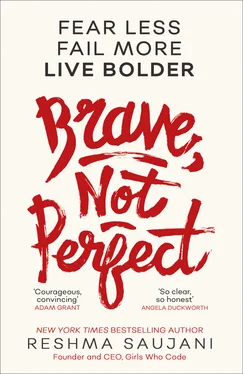Not surprisingly, girls are more prone to a fixed mindset than boys. This is partially because, as Dr. Dweck’s research showed, parents and teachers tend to give boys more “process praise,” meaning they reward them for putting in effort, trying different strategies, sticking with it, and improving, rather than for the outcome. In the absence of this kind of process praise, girls come to believe that if they can’t get something right away, they’re dumb. You can see how this impacts us later in life, as we take even the smallest daily mistakes as indicators of fundamental limitations. We forget to pick up the school supplies our kid asked for = we’re bad moms. We get a ticket for a broken taillight that we’d been meaning to take care of = we’re idiots. We see a failure as a definitive condemnation of our worth, rather than seeing ourselves and our abilities as works in progress.
The single best example I can point to of girls being trapped in a fixed mindset is in relation to STEM subjects (science, technology, engineering, math). As you might imagine, being the founder of an organization that teaches coding to girls, I hear the refrain “I’m just not good at math” a lot. Like Destiny, who cringed when the boys made fun of her for taking so long up at the board to solve a math problem, or like the girls who delete their work in coding classes, it isn’t a lack of interest or capacity in these subjects that scares them off, but a perception that they’re fundamentally bad at it. After being told outright—or subtly, through the micromessages we’ll talk about in the next chapter—that boys are naturally better at math and computing (they aren’t) and that girls are innately more suited for humanities (again, not true), they believe to their core that their abilities in these subjects—or lack thereof—are carved in stone.
Of course, they aren’t. Carol Dweck points out that no one is born with a fixed mindset; in fact, we all come prewired with a desire to learn and grow. It’s only once children begin to evaluate themselves (I’m smart/not smart) that they become afraid of challenges. Thankfully, as adults, we can undo that long-ago wiring by taking on the practice of bravery in the here and now.
On a gray afternoon in late January, I sat around a conference table talking with a group of high school girls from Harlem. Kim, the most opinionated of the group, sat up straight with unusual presence for a girl her age. All outward signs pointed to a confident, secure young woman so I was surprised when she shared her inner reality with us.
“I feel like whenever girls speak up for themselves, we get slapped down for it because it seems like we’re being bossy,” she said. “Especially if I stand up for myself as a black woman specifically, boys really don’t get it. If a boy does it, it’s like he’s a boss man . . . but if it’s me, I’m just an angry black woman. Boys will say dumb stuff like they only like light-skinned girls . . . if I speak up to them, they tell me I just like to complain and dismiss me.”
“But you’re pretty outspoken,” I said. “Does their reaction have an effect on you?”
“Please . . . you think I want to be smacked down for what I think all the time?” Kim put on a good show of sounding tough as she spoke, but I could hear a tiny tremor in her voice. Her bravado didn’t quite match the vulnerability peeking through. After a beat and a few hard blinks of her eyes, she explained that she just found it easier to stay quiet than deal with the boys trying to put her down. “Everyone thinks I don’t care but I do,” she continued. “I feel like anything I say will just turn into a whole big thing, and then everyone will get into it and turn on me, too, so I don’t bother.”
The other seven girls around the table all nodded knowingly. Don’t be too much, don’t say too much, and definitely don’t say anything that makes you sound angry or bossy. Got it.
From the time girls are young, they’re trained to keep a lid on anger in the face of an affront, unlike boys who are trained to stand up for themselves, or retaliate. This explains why girls (and women) will do almost anything to avoid rocking the boat, and why they choose to downsize their personal power and swallow negative feelings, rather than be seen as boastful or face the horror of confrontation. Praised on the one hand by parents and teachers for being polite, agreeable, and “well behaved” and, on the other, punished by their peers for speaking out, the docility girls are rewarded for as children translates directly into a lifelong habit of suppressing their instinct to speak up and take a risky stand. Mansplaining and dominance plays aside, it’s not surprising that findings show women speak less than 75 percent of the time than men do in conference meetings.
Modesty—another prized virtue for girls—also plays a hand in keeping us quiet and meek. I recently heard a story about a sixth-grade graduation ceremony in suburban Ohio, where a handful of kids were presented with awards for academics or leadership. A mom of one of those students described the scene for me: When a boy won an award, he would saunter up to the stage with a swagger. More than one “dabbed”–a hip-hop dance move that lots of pro athletes use in moments of triumph. When a girl won, she would throw her hands up to her face feigning a look of shocked surprise as if to say, Who, me? You want to give an award to me ?
So why don’t girls dab, too? Because if being a confrontational bitch is the first cardinal sin for girls, being seen as conceited runs a close second. So they downplay, demur, and hold back. Add ten, twenty, thirty years to this story and we see that modesty devolved into an uncomfortable meekness. It makes us squeamish to self-promote our professional accomplishments (possibly because we know other women will judge us for it, just like we’d judge them), yet our male colleagues proudly trumpet theirs. We underestimate our abilities and hold off going for a job unless we are absolutely sure we’re 100 percent qualified, while men charge ahead if they come in around 60 percent qualified. We undervalue our contribution to a collaborative project and give more credit to our male teammates, as a fascinating study from Michelle Haynes of the University of Massachusetts and Madeline Heilman of New York University revealed.
At age thirty-eight, Vanessa is a successful dermatologist. She’s one of those people who radiates competence, so you wouldn’t think that she’d fall prey to the same trepidation about touting her accomplishments. Yet on a routine visit to get her teeth cleaned, her (older, male) dentist, upon hearing what she does for a living, immediately launched into a story about his son who was a resident in medical school. “I just sat there as he went on and on about how I should call his son because he could probably give me some good advice about the business,” she said. “I was thinking, huh? Never mind that I own my own practice with three associates, or that I’ve been listed as a top doctor in national magazines. I still sat there not feeling brave enough to tell him it was probably his son who should be calling me for advice.”
Caught in the “double bind” that says we need to be assertive and confident if we want to get ahead, but knowing we’ll get heaped with disapproval if we do, we tread lightly. When someone compliments us, we humbly deflect. This is one I definitely struggle with. Every time someone introduces me before a speech, they inevitably read off the awards I’ve won. Then I’ll get up there and make a joke about how my dad probably put them up to it. I’m pretty sure no guy would ever do that.
Quiet. Contained. Modest. Diligent. Likable. Easy to get along with. You can see how all these accolades might have earned us high praise in girlhood but aren’t necessarily doing us any favors as grown women.
Читать дальше












